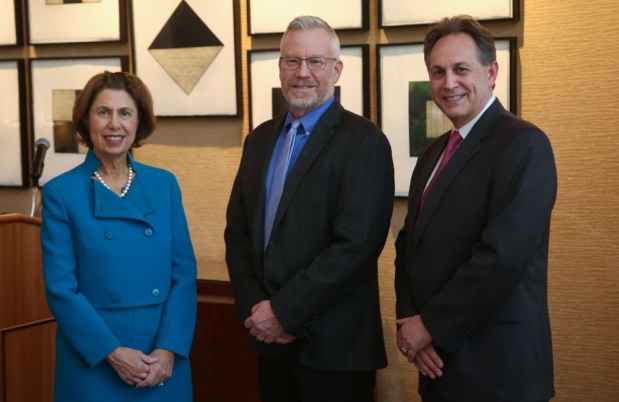On June 1, 2021, in a collaboration that will elevate the field of coaching, the International Coaching Federation (ICF) pledged to give $575,000 over five years to McLean Hospital, a Harvard Medical School affiliate, to benefit a grantmaking program at the hospital’s Institute of Coaching (IOC).
Carol Kauffman, PhD, IOC founder and co-chair, and Margaret Moore, MBA, IOC co-founder and chair, noted that the collaboration with the ICF has been a long-held aspiration. The goal is to more broadly educate the coaching field on the existing rich and impactful scientific literature and to expand on current coaching literature.
“We’re the intellectual hub for coaching science and research, and they’re the largest, most well-known community of certified coaches,” said Moore.
Scott L. Rauch, MD, president and psychiatrist in chief for McLean, added that coaches have an integral role in supporting individuals in many different facets.
“Coaches help people cultivate skills that improve leadership, health, well-being, and resilience, and reach their personal and professional goals,” said Rauch. “As we have all experienced during the pandemic, the need for developing such skills is more vital than ever before. Together, the IOC and ICF will benefit a large group of professional coaches who will have a far-reaching impact on clients worldwide.”
Thought Leaders in the Field
The IOC was founded in 2009 to expand the integrity and impact of coaching through science. Its mission is to educate coaches on the broad scientific foundation that supports coaching techniques and processes.
Translating the psychological sciences and coaching research into best coaching practices, in addition to funding research grants, the IOC gathers and translates the fast-growing body of scientific literature into articles, webinars, master classes, discussion groups, and other educational opportunities.
Founded in 1995, the ICF is the world’s largest organization for the global advancement of the coaching profession. It is consistently recognized among coaching professionals worldwide for initiatives that include developing coaching core competencies, establishing a professional code of ethics and standards, providing continuous education through world-class events, and leading and informing conversations about the future of coaching.
The ICF ecosystem is made up of six family organizations that reflect its interests in many areas of the industry: ICF Professional Coaches, ICF Credentials and Standards, ICF Coach Training, ICF Foundation, ICF Coaching in Organizations, and ICF Thought Leadership Institute.

Recognizing the importance of scientific inquiry and data in advancing coaching best practices, the IOC established a coaching research grant program in 2009 based upon the vision and philanthropy of the Harnisch Foundation. Since then, the IOC has awarded 38 Harnisch grants totaling $800,000 for research, travel, and graduate student fellowships.
The $575,000 philanthropic grant from ICF will support compelling research that ultimately enhances the quality, efficacy, and impact of the coaching field.
ICF has approximately 45,000 members in over 147 countries. Through the collaboration, its members can now access and participate in IOC research and apply for IOC grants. The IOC will be able to broadly disseminate its research and evidence-based curriculum across a large, international group.
Moore, Kauffman, and ICF’s CEO, Magdalena Nowicka Mook, MS, expressed their excitement about the collaboration, citing the growing popularity of this relatively young profession around the globe.
“It is tremendously important that there are robust scientific underpinnings to support coaching, to support the new applications of coaching, and to make sure professional standards are being upheld,” said Mook. “We’re observing another wave in the evolution in professional coaching. This partnership will accelerate the transition to yet another level of our knowledge—as well as an acknowledgement of professional coaches.”
Kauffman, an assistant professor of psychology in the Department of Psychiatry at Harvard Medical School, noted that coaching is a powerful vehicle for change at an individual and organizational level. “It empowers all of us to be at our best. Creating research that is based on scientific theories of deep change and continuing to examine the effectiveness of coaching will be of service to the field and the world,” she said.
Media Requests
Journalist or member of the media? We are available 24/7 for media requests.



